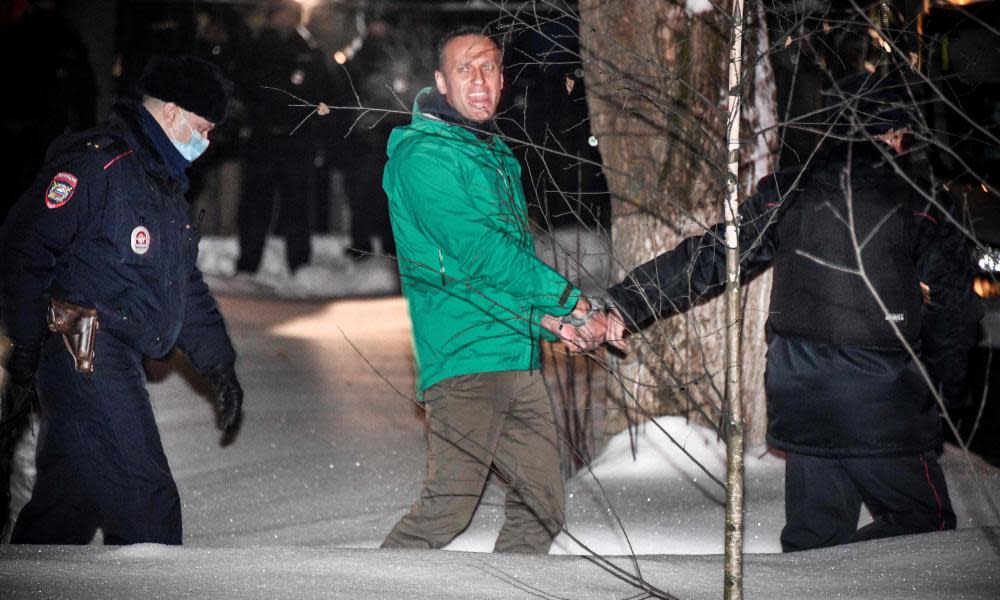Even in a Moscow jail, Alexei Navalny is dangerous to Putin

For more than a decade, Vladimir Putin has refused to say Alexei Navalny’s name in public, referring to him as “that gentleman”, or more recently, the “patient”, a reference to his suspected poisoning by FSB agents.
In the logic of politics, Putin is simply trying not to give the Russian opposition leader free advertising. But his linguistic game also points to a rivalry that has become deeply personal, stoked by a decade of attacks against friends and family, and made urgent by the understanding that Navalny will not back down despite the threat of death by poisoning or prison.
On Tuesday, Navalny’s team released a mammoth investigation into Putin’s wealth, including a £1bn palace on the Black Sea allegedly built for the Russian president that Navalny called “the biggest bribe in history”.
Related: Vladimir Putin is not scared of Alexei Navalny, says Kremlin
Even inside Moscow’s notorious Matrosskaya Tishina jail, Navalny has remained personally dangerous to the Russian leader, determined to expose his two decades in power as nothing more than a swindle.
Having released details of the seaside idyll, underwritten by his friends and state companies, Navalny’s team then twisted the knife, claiming that the safety-obsessed Putin would have to abandon the palace because they had released its architectural plans to the public.
Navalny has never shied away from direct attacks against Putin, labelling him as early as the 2011/12 mass protests a “thief” and his United Russia as the “party of crooks and thieves”. He bet that anger over corruption would outweigh support built on patriotism and better living standards after the 1990s. His criticisms challenged the Kremlin narrative that Putin had returned Russia to a great power status.
Critics of Putin maintain that Navalny is the greatest threat to his government. “Putin is no longer afraid of western sanctions, critical statements and the demands of European and American politicians for further isolation,” Zhanna Nemtsova, the daughter of the murdered opposition politician Boris Nemtsov, wrote in an article for Bild on Tuesday. “For him the stakes are too high – he knows that Navalny is capable of overthrowing his regime.”
Whether or not that is true, Navalny has proven himself to have political talents that Putin does not: he is a charismatic speechmaker who actually appears to enjoy being on stage, an effective protest leader and a witty digital campaigner who can reach young, tech-savvy Russians, a demographic that the Kremlin is worried it is losing. By returning to the country on Sunday, he also exhibited a personal courage that many believe has been lost in Russia’s cynical politics. Supporters at Vnukovo airport in Moscow compared him, somewhat prematurely, to Nelson Mandela.
On the day of the epiphany, when Russians bathe in ice-cold lakes and rivers to wash away their sins, Putin stepped into a cross-shaped pool near his Moscow residence and plunged his head below the surface three times, coming up each time to cross himself.
Next in “meanwhile Vladimir Putin” — an epiphany dip in front of an ice carved Jesus pic.twitter.com/3TPyvCqNlT
— Mary Ilyushina (@maryilyushina) January 19, 2021
Navalny, meanwhile, spent his first full day in Matrosskaya Tishina jail, isolated in a three-person cell as a measure against the coronavirus epidemic. He told an independent prison monitor that he had not been abused and that he was glad to be back in Russia.
It is not hard to guess why Navalny may be a target for retribution. His and Bellingcat’s recent investigation into his poisoning was deeply embarrassing for the FSB, an organisation that Putin once ran. And his exposés of government corruption have naturally led him in one direction: Putin’s friends and family. Navalny played an important role in identifying Katerina Tikhonova, a Moscow State University official, as Putin’s daughter.
“It is more than just a dynastic succession,” he told Reuters in 2015, calling the system “neo-feudal”. “Children don’t just inherit their parents’ posts, but also the right to choose any other post they fancy. The danger is that very soon, all key resources will end up in the hands of five to seven families.”
After his arrest, his ally Vladimir Ashurkov said Navalny had given him a list of people he believed should be sanctioned to punish the Russian government. Among them were two wealthy Russian businessmen, Roman Abramovich and Alisher Usmanov, and the sons of two senior security officials, Nikolai Patrushev and Alexander Bortnikov.
“The west must sanction the decision-makers and the people who hold their money,” he quoted Navalny as saying. “Nothing less will make an impact on the behaviour of the Russian authorities.”

 Yahoo News
Yahoo News 
